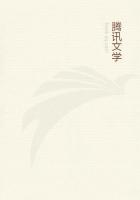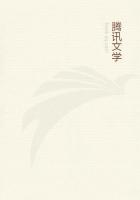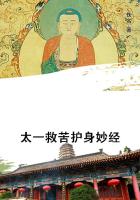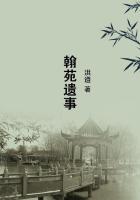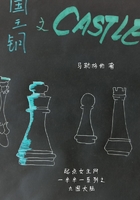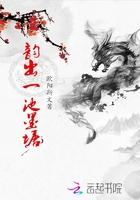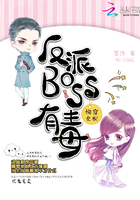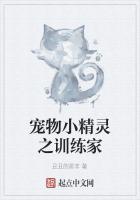Colomba, without answering, drew her /mezzaro/ closer about her head, called the watch-dog, and went out followed by her brother. Striding swiftly out of the village, she turned into a sunken road that wound among the vineyards, sending on the dog, to whom she made some gesture, which he seemed to understand, in front of her. He instantly began to run zigzag fashion, through the vines, first on one side and then on the other, always keeping within about fifty paces of his mistress, and occasionally stopping in the middle of the road and wagging his tail. He seemed to perform his duties as a scout in the most perfect fashion imaginable.
"If Muschetto begins to bark, brother," said Colomba, "cock your gun, and stand still."
Half a mile beyond the village, after ****** many detours, Colomba stopped short, just where there was a bend in the road. On that spot there rose a little pyramid of branches, some of them green, some withered, heaped about three feet high. Above them rose the top of a wooden cross, painted black. In several of the Corsican cantons, especially those among the mountains, a very ancient custom, connected, it may be with some pagan superstition, constrains every passer-by to cast either a stone or a branch on the spot whereon a man has died a violent death. For years and years--as long as the memory of his tragic fate endures--this strange offering goes on accumulating from day to day.
This is called the dead man's /pile/--his "/mucchio/."
Colomba stopped before the heap of foliage, broke off an arbutus branch, and cast it on the pile.
"Orso," she said, "this is where your father died. Let us pray for his soul!"
And she knelt down. Orso instantly followed her example. At that moment the village church-bell tolled slowly for a man who had died during the preceding night. Orso burst into tears.
After a few minutes Colomba rose. Her eyes were dry, but her face was eager. She hastily crossed herself with her thumb, after the fashion generally adopted by her companions, to seal any solemn oath, then, hurrying her brother with her, she took her way back to the village.
They re-entered their house in silence. Orso went up to his room. A moment afterward Colomba followed him, carrying a small casket which she set upon the table. Opening it, she drew out a shirt, covered with great stains of blood.
"Here is your father's shirt, Orso!"
And she threw it across his knees. "Here is the lead that killed him!"
And she laid two blackened bullets on the shirt.
"Orso! Brother!" she cried, throwing herself into his arms and clasping him desperately to her. "Orso, you will avenge him!"
In a sort of frenzy she kissed him, then kissed the shirt and the bullets, and went out of the room, leaving her brother sitting on his chair, as if he had been turned to stone. For some time Orso sat motionless, not daring to put the terrible relics away. At last, with an effort, he laid them back in their box, rushed to the opposite end of his room, and threw himself on his bed, with his face turned to the wall, and his head buried in his pillow, as though he were trying to shut out the sight of some ghost. His sister's last words rang unceasingly in his ears, like the words of an oracle, fatal, inevitable, calling out to him for blood, and for innocent blood! I shall not attempt to depict the unhappy young man's sensations, which were as confused as those that overwhelm a madman's brain. For a long time he lay in the same position, without daring to turn his head. At last he got up, closed the lid of the casket, and rushed headlong out of the house, into the open country, moving aimlessly forward, whither he knew not.
By degrees, the fresh air did him good. He grew calmer, and began to consider his position, and his means of escape from it, with some composure. He did not, as my readers already know, suspect the Barricini of the murder, but he did accuse them of having forged Agostini's letter, and this letter, he believed, at any rate, had brought about his father's death. He felt it was impossible to prosecute them for the forgery. Now and then, when the prejudices or the instincts of his race assailed him, and suggested an easy vengeance--a shot fired at the corner of some path--the thought of his brother-officers, of Parisian drawing-rooms, and above all, of Miss Nevil, made him shrink from them in horror. Then his mind dwelt on his sister's reproaches, and all the Corsican within him justified her appeal, and even intensified its bitterness. One hope alone remained to him, in this battle between his conscience and his prejudices--the hope that, on some pretext or other, he might pick a quarrel with one of the lawyer's sons, and fight a duel with him. The idea of killing the young man, either by a bullet or a sword-thrust reconciled his French and Corsican ideas. This expedient adopted, he began to meditate means for its execution, and was feeling relieved already of a heavy burden, when other and gentler thoughts contributed still further to calm his feverish agitation. Cicero, in his despair at the death of his daughter Tullia, forgot his sorrow when he mused over all the fine things he might say about it. Mr. Shandy consoled himself by discourses of the same nature for the loss of his son. Orso cooled his blood by thinking that he would depict his state of mind to Miss Nevil, and that such a picture could not fail to interest that fair lady deeply.
He was drawing near the village, from which he had unconsciously travelled a considerable distance, when he heard the voice of a little girl, who probably believed herself to be quite alone, singing in a path that ran along the edge of the /maquis/. It was one of those slow, monotonous airs consecrated to funeral dirges, and the child was singing the words:
"And when my son shall see again the dwelling of his father, Give him that murdered father's cross; show him my shirt blood-spattered."
"What's that you're singing, child?" said Orso, in an angry voice, as he suddenly appeared before her.

